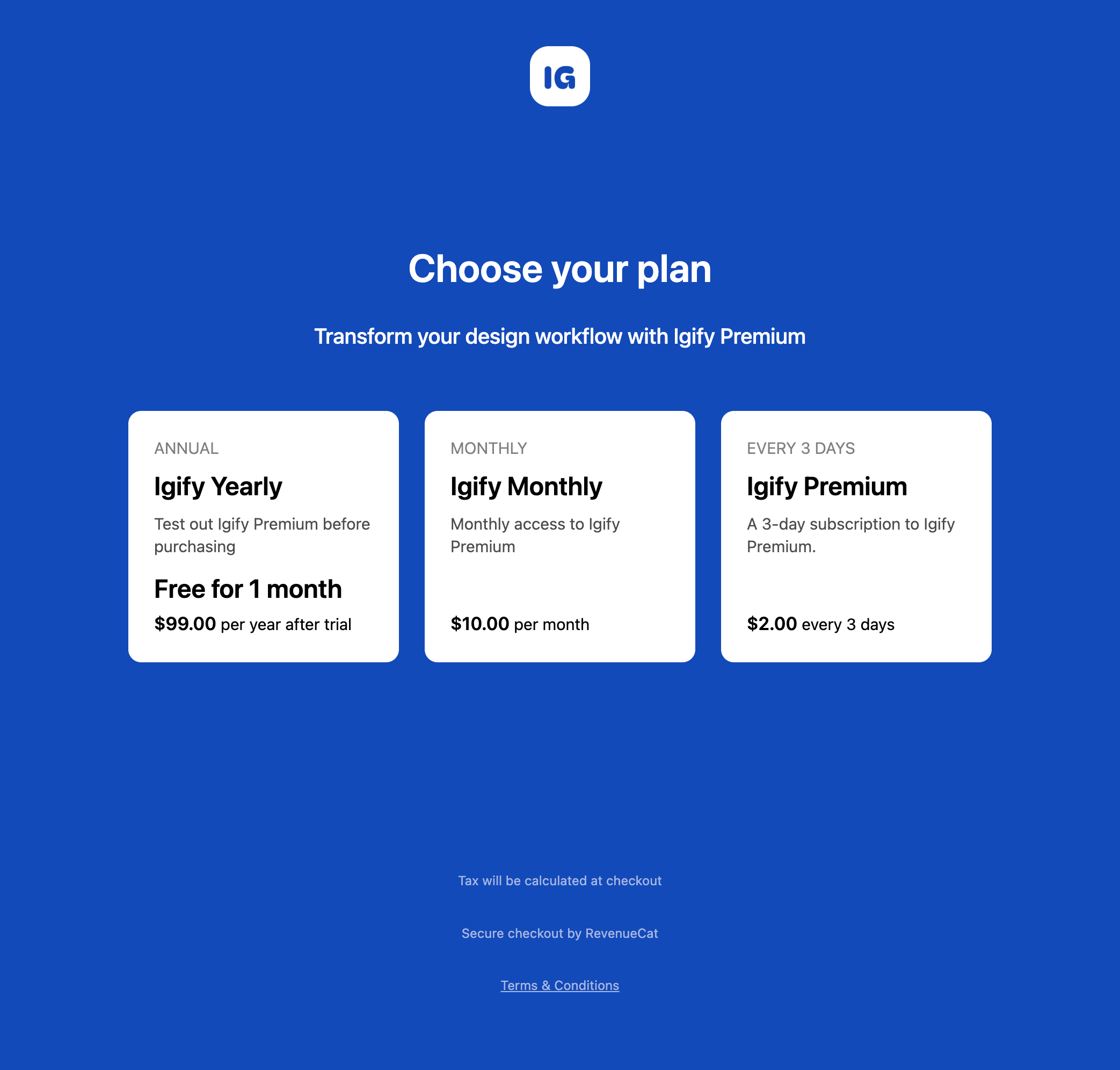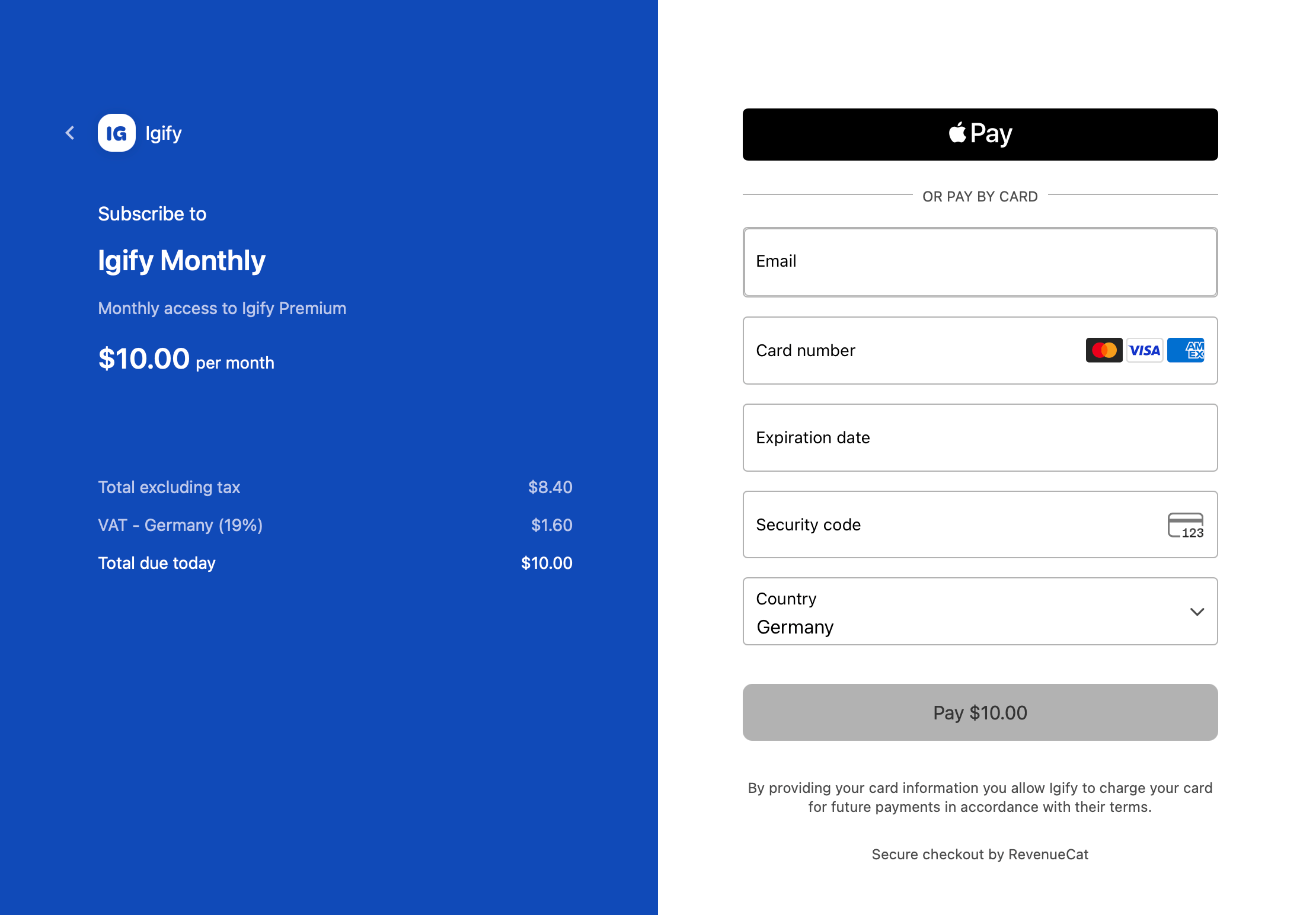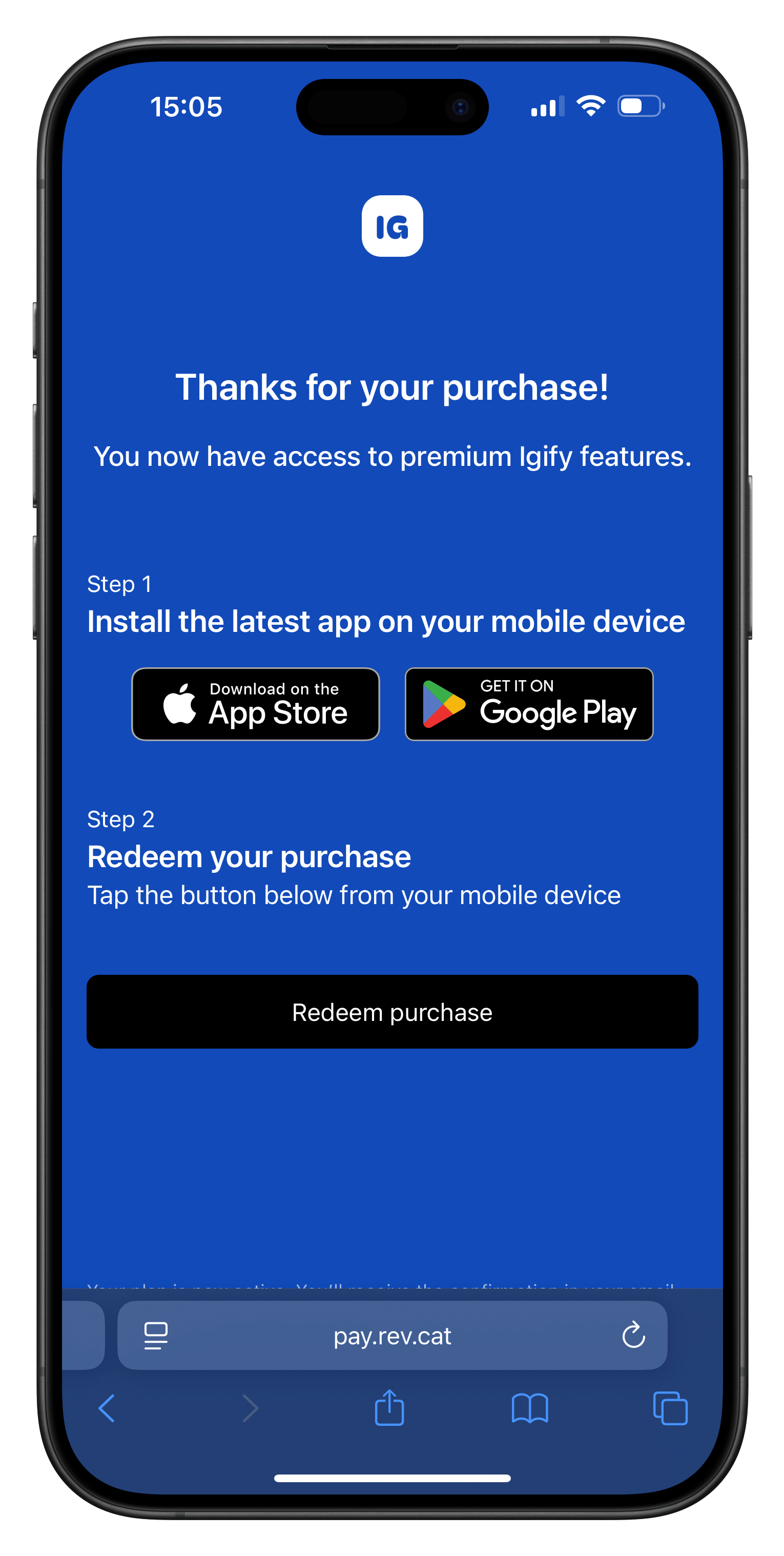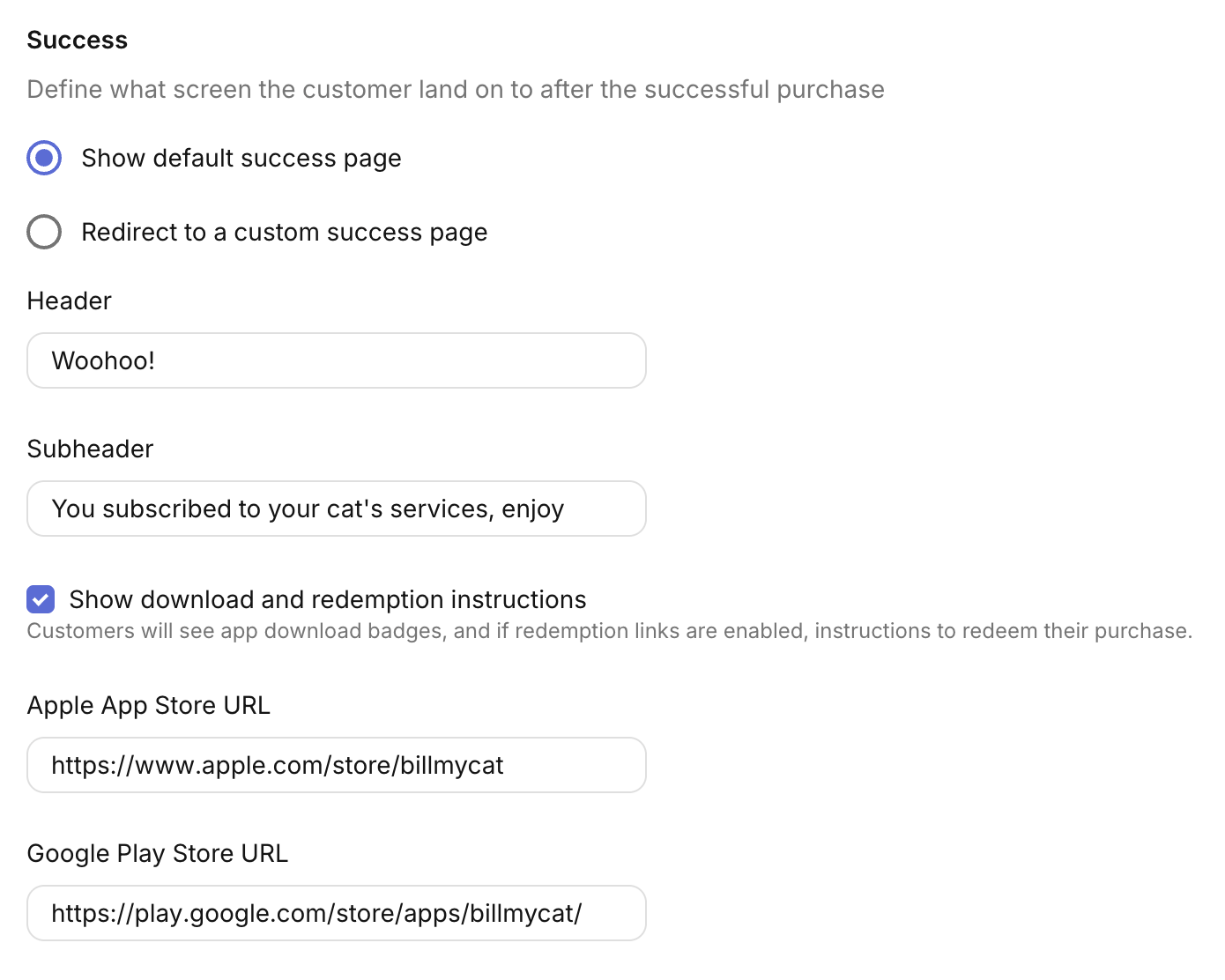Web Purchase Links
Generate a RevenueCat hosted paywall and checkout flow with just a few clicks
Use Web Purchase Links to enable customers to purchase a web subscription directly without writing code, through a RevenueCat-hosted purchase flow.
Web Purchase Links support a range of use cases, with both identified and anonymous purchases. For identified users, append the customer's App User ID to the provided URL. For anonymous purchases, utilize Redemption Links, which allow customers to buy subscriptions without an App User ID and later associate the purchase with their account in your app.
Creating a Web Purchase Link
You can set up Web Purchase Links with RevenueCat Web Billing or Paddle Billing as the checkout. The checkout configuration and styling options below only apply when using RevenueCat Web Billing as the checkout (see the Paddle app-to-web purchases guide for instructions on configuring Paddle).
Web Billing
- Connect payment provider: To set up a Web Purchase Link with Web Billing, make sure to connect your Stripe account with RevenueCat, if you haven't already done so. This can only be done by the the project owner.
- In the Apps & providers section, add a Web Billing config.
- Create the Web Billing products you want to serve through your Web Purchase Link
- Create an offering with those products
- In the Web section in the main menu, click on the Create web purchase link button to open the form.
To support anonymous purchases, configure Redemption Links in your Web Billing config settings.
Paddle Billing
To configure a Web Purchase Link with Paddle Billing, see the first steps in Paddle app-to-web purchases to create a Paddle config, products and an offering containing the products.
Customize the Web Purchase Link
Package selection (paywall)
When customers open your Web Purchase Link, they land on a package selection page. You can choose from two options for this page:
- Show the default package selection page (has lightweight customization and branding options)
- Present a paywall (fully customizable using RevenueCat's paywall builder)
Configuring the default package selection page
The products shown there come from the offering you’ve linked, and customers can choose from those products.

You can customize:
- Page header and subheader
- Whether product descriptions show above product names (check the product setup step for more info)
- Terms and conditions URL (footer)
- Look and feel, including colors and shape styling (configured separately in the web config's customization)
It's possible to skip this page, and pre-select a package by passing a package_id URL parameter.
Presenting a paywall as the package selection page
To see how to configure a paywall in your web purchase link, see Web Paywalls.
Checkout
Once a product has been selected, in Web Purchase Links using Web Billing, customers will be presented with the checkout:

What affects the checkout experience
- Payment methods change depending on browser, location and configuration (see payment methods)
- Product information, prices and currencies are configured in the products (see product setup)
- Tax collection is configured in the payment provider settings and Stripe dashboard (see sales tax & VAT)
- Colors and button styles are configured in customization (see customization)
- Email address can be pre-populated (see URL parameters)
Success behavior
After completing a purchase, there are two configurable options:
Show the default success page
- Customizable header and subheader.
- Optional app download links and purchase redemption instructions (for Redemption Links)
Redirect to a custom success page
- Can be used to redirect to a post-purchase experience on your own website
- The app user id is appended as a URL parameter (
app_user_id) so you can further customize the post-purchase experience - Can also be used to redirect the user back into the mobile app, using a custom URL scheme (requires the url scheme to be registered with the app beforehand)
- When Redemption Links are enabled, the redemption URL is automatically included as a query parameter named
redeem_url
Success page customization
Here's a default success page, with customized content, styling, and Redemption Links enabled:

You can customize:
- Page header and subheader
- Whether to show app download badges
- App download links (overrides only for this Web Purchase Link; defaults to app config if left empty)

As soon as you save the above settings, those changes will be reflected immediately in your production purchase links.
You can always run tests by creating a Web Purchase Link for a different offering, and testing in sandbox.
Choose what happens for returning customers
You can choose what happens when a customer already has an entitlement or an active subscription and they return to a web purchase link.

Show the success page
Automatically skips the package selection and checkout pages. It will use the configuration you set up for the success page (show a download page or redirect to a custom URL).
Allow them to make another purchase
Allows the returning customer to purchase another product.
Allowing multiple purchases is useful for consumable products, or when selling multiple different products to a single customer. The transaction will fail if the customer tries to purchase the exact same product twice (for subscriptions and non-consumables). Consumable products can be purchased multiple times.
We suggest creating a dedicated offering and web purchase link for non-consumables to make sure all products can be bought as many times as the customer wants.
Distributing Web Purchase Links
When you configure a Web Purchase Link, you’ll get two URLs: one for Production and one for Sandbox.
Example format: https://pay.rev.cat/<ProductionTokenWeGenerate>.
To access these click Web in the main menu, then select your Web Purchase Link from the table. Now click Share URL to copy the URL template.
The Sandbox URL allows you to test purchases using Stripe test card numbers. Do not distribute this link or whoever will use it will be able to subscribe to your application for free using one of the Stripe testing cards.
Distributing to identified users (where the App User ID is known)
Displaying the purchase link in a web app where users are logged in
You must append the URL-encoded App User ID of the customer to the link. This ensures the purchase is associated with the specific user immediately. If the ID is not appended, users will see a 404 error page on visiting the URL.
Web Billing works with identified customers. You need to specify a unique app user id for each one of the subscribers you want to reach with this link. You can read more about this requirement here.
Distributing to anonymous users (where the App User ID is not known)
Embedding the purchase link on a public landing page or on social media
Configure Redemption Links, which removes the need to append IDs to the URL. This approach generates anonymous user IDs, allowing customers to purchase subscriptions without prior identification. They can later associate these purchases with their accounts within your app. For comprehensive guidance on setting up and using Redemption Links, refer to the Redemption Links documentation.
Additional URL parameters
We recommend that all URL parameters are URL encoded to avoid issues.
Web Purchase Links support appending the following URL parameters to further customize the behavior:
Email
If you already have your customer's email address, use email to preset an email address on the payment page (cannot be overridden by subscribers): https://pay.rev.cat/<someProductionTokenWeGenerate>/<yourAppUserId>?email=<customerEmail>
Currency
If you want to specify a currency manually, you can do so by appending the currency query parameter to the URL. This will override the automatic currency selection.
Package ID
Allows you to pre-select a package by referencing a RevenueCat package_id for a package in the offering, and send users directly to the checkout page.
Custom metadata
See custom metadata
Skip purchase success
Add skip_purchase_success=true to bypass the final "Purchase Complete" step and immediately trigger your configured success behavior (success page or custom redirect).
Redirect when using WPL in iframes
Add use_top_target_when_redirecting=true if you are using WPLs in an iframe and want the parent page to redirect to your redirect_url.
If not specified the WPL will redirect using target="_self" causing only the iframe to redirect to your redirect_url.